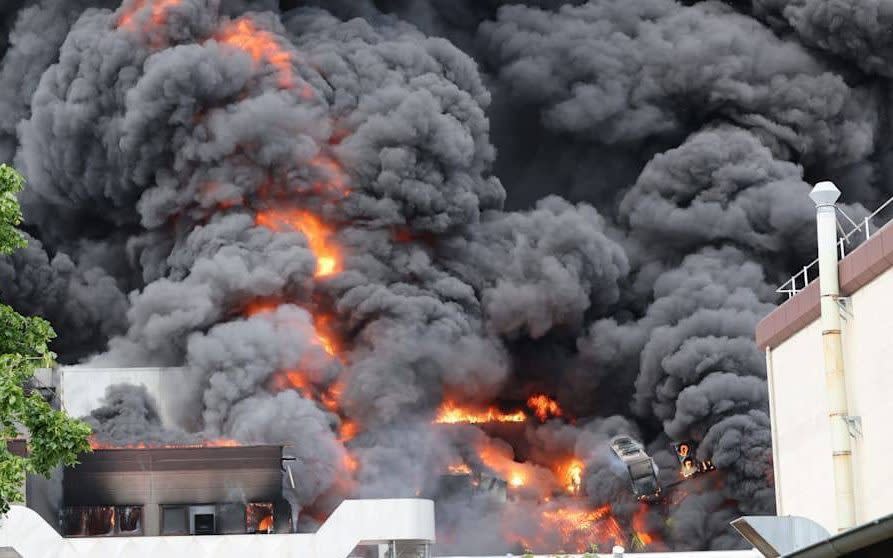Germany is ‘classical battleground in Putin’s hybrid war on Nato’

- Oops!Something went wrong.Please try again later.
Germany has become a “battleground” in Vladimir Putin’s hybrid war on Nato due to decades of lax security and pro-Russian sympathisers in the east, a senior intelligence chief has warned.
In an interview with The Telegraph, Stephan Kramer, the head of domestic intelligence in Germany’s eastern Thuringia state, said Moscow viewed Berlin as a “wonderful” sabotage target, as he urged extra vigilance.
“Germany… as it is located in the middle of Europe, is a wonderful target for all types of logistical sabotage. Almost any supply for Ukraine has to go through Germany,” Mr Kramer said.
“Combined with the political situation – a good portion of Germans in the east are pro-Russia, doubting [their[ own government and public structures - and the unsecured critical infrastructure, this is the classical battleground for a successful hybrid warfare,” he added.
Since the invasion of Ukraine, Russia has been waging what Nato officials call a “hybrid warfare” campaign against Kyiv’s allies.
The strategy relies on a mixture of sabotage operations targeting key infrastructure, election interference, cyber-attacks and other covert means of undermining Western countries.
‘Putin feeds the extreme Left and Right’
Mr Kramer also warned that Russia was “feeding into feelings of chaos and the delegitimisation of public structures on all channels” in Germany.
Russian sympathies in eastern Germany are largely due to its former status as a satellite Soviet state, the GDR, during the Cold War.
All Nato states are concerned about hybrid warfare but the situation is particularly tense in Germany, where a recent, mysterious fire at an arms factory in Berlin is now suspected of being an act of Russian sabotage.
Mr Kramer noted that other Nato allies have spent years securing critical infrastructure whereas Germany only started that discussion “some months ago”.
Germany was also being destabilised by Russian and Chinese bids to undermine democracy and to encourage distrust towards German leaders, he said. “Putin feeds the extreme left and right no matter what, so that in the end our democracy is ruined,” he warned.
He also suggested that the “stressful” pandemic has left the German public in some areas resentful towards the state. And he warned that the “long preserved, false, feeling of living in general peace” may have made Germany too complacent about the threat from Russia.
Olaf Scholz, the German chancellor, announced a “Zeitenwende,” or turning point, in the wake of Putin’s invasion, vowing to overhaul the country’s defence and foreign policy completely.
This involved a €28 billion (£23 billion) funding pledge for Ukraine, major investment in the German army, and the possible return of conscription, which was scrapped in 2011.
While Germany has stopped short of some key demands, such as sending powerful Taurus missiles to Kyiv, the change in their wider approach to Putin appears to have put the country firmly in his crosshairs.
In May, a major fire broke out at a factory in Berlin belonging to the Diehl group, a German defence firm supporting the Ukrainian war effort.
German investigators initially said the blaze was an accident, but have since received intelligence from Nato allies which strongly suggests it was an attack by Russian saboteurs. The German-led investigation is ongoing.
One month earlier, two alleged Russian spies were arrested in Bavaria on suspicion of plotting to attack a US military facility which supports Ukraine.
German officials are also increasingly suspicious of the far-right AfD party, which came second place in the European elections after campaigning against mass migration, Russian sanctions and costly support for the war in Ukraine.
Earlier this year police arrested Jian Guo, an aide who was working for a senior AfD MEP, Maximilian Krah, on suspicion of spying for China in Brussels. He has since been ejected from the party’s Brussels delegation.
Mr Krah himself is also under investigation for receiving suspicious payments from Russia and China. He denies any wrongdoing.


